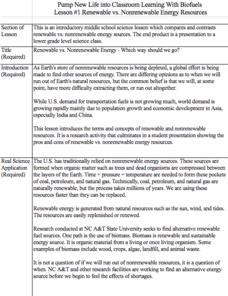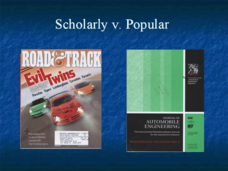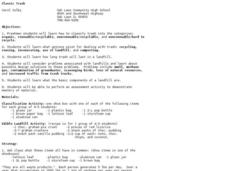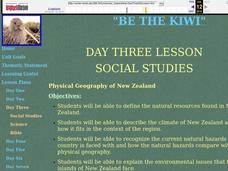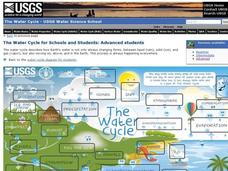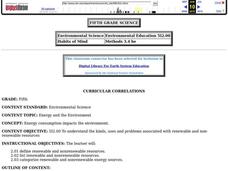Curated OER
Popcorn Geography
Students use kernels to create a "Top Corn-Producing States" map or graph. They read and round off numbers. Students identify on a U.S. outline map the location of corn-growing states. They create a visual (map or graph) illustration...
Kenan Fellows
Renewable vs. Nonrenewable Energy Resources
Is one type of energy inherently good or bad? Young scientists explore energy resources in a week-long unit. After extensive research, groups create powerful position statements and presentations supporting their energy resource of choice.
Curated OER
Scholarly v. Popular (Journals)
How do you determine whether a resource is credible or not? Contrary to what your class probably believes, just because it's published doesn't mean it provides accurate information! So how does one determine if it's credible? Use this...
Carnegie Mellon University
Transportation
Teach your environmental studies, life science, or engineering class how an internal combustion engine works using the first few slides of the accompanying presentation. Then, focus in on the resulting carbon emissions. Finally, take a...
Jefferson Lab
The Periodic Table of Elements
A study of the periodic table of elements doesn't have to be elementary! Deepen understanding of the building blocks of chemistry with an interactive periodic table. At first sight, the table looks like a standard reference page, but a...
Curated OER
Classic Trash
Students investigate how trash is classified and the options to deal with it. In this trash and recycling lesson, students perform an activity to classify trash into organic, renewable/ recyclable, now renewable/recyclable and...
Curated OER
Activity #9 Extending Oil Well Production
Middle schoolers simulate methods used to extend the effective life of an oil well by extracting less available oil. They identify techniques which can be used and evaluate their effectiveness. Pupils are introduced to rock size and...
Curated OER
Products Made from Petroleum
Students research products made from petroleum. For this transportation lesson students try to find products other than fuel, made from petroleum. They look for the most unusual or surprising products and describe the history and...
Curated OER
Be the Kiwi
Students explore aspects of New Zealand's environment. In this environmental geography lesson, students research the geography, resources and climate of New Zealand. This lesson includes a game, rubric, and extension.
Curated OER
Lesson Six
Young scholars investigate the importance of ocean resources and what humans need to do to maintain a healthy ocean. In this oceans lesson plan students participate in an activity after viewing a PowerPoint presentation on the...
Curated OER
Energy Resources Scavenger Hunt
In this environment activity, students complete each of the statements with its correct energy resource. They identify and name various types of plants and rocks. Students also identify and explain how fertilizer works and how it can be...
Curated OER
Costs of Living
Students consider the effects of rising oil and natural gas prices on family spending and saving habits. They design a board game intended to help people save.
Curated OER
A world of oil
Learners practice in analyzing spatial data in maps and graphic presentations while studying the distribution of fossil fuel resources. They study, analyze, and map the distribution of fossil fuels on blank maps. Students discuss gas...
Curated OER
Gasoline Use Around the World
Students contribute their own personal gasoline consumption data with other schools. They share thoughts and opinions on fossil fuels, its effects and what they can do in an effort to conserve natural resources.
Center for Learning in Action
Water—Changing States (Part 1)
Here is part one of a two-part lesson in which scholars investigate the changing states of water—liquid, solid, and gas. With grand conversation and up to three demonstrations, learners make predictions about what they think will happen...
American Museum of Natural History
Take the Climate Quiz
Climate and weather are often confused. Pupils answer questions online to review concepts related to climate and weather changes. They get immediate feedback and additional facts with each question. The lesson is appropriate as a remote...
Curated OER
Wipe Out
Learners examine the flow of water. They observe and test the properties of water by using sticks in flowing water. The lesson has streaming video, resource links to access, and a good hands-on activity that is clearly described in the...
US Geological Survey
The Water Cycle for Schools: Advanced Ages
Explore the water cycle in an interactive diagram of the process. The diagram shows how water is a moving system and constantly changing forms. The resourc includes vocabulary words that pupils click on in order to discover more about...
Curated OER
Modeling Oil and Gas Reservoirs
Students investigate energy by researching how oil reservoirs work. In this fossil fuels lesson, students conduct an experiment using a half full bottle of water, corn oil and oxygen, recording their data as the elements are mixed...
Curated OER
Energy and the Environment
Fifth graders define terms associated with renewable and nonrenewable resources. They identify materials that are renewable and nonrewable. They categorize a list into the correct type of resource.
Curated OER
Make a difference
Young scholars figure out math equations based on the recycling of cans and gas consumption. In this recycling lesson plan, students have challenge cards that ask them challenge questions on how to save gas and what a difference...
Carnegie Mellon University
How Power Plants Work 1
First of three lessons, this is a great start to a unit on energy. As you demonstrate, learners discover different types of energy and how it is converted from one form to another. They then focus in on the generation of electricity by...
Wild BC
The Greenhouse Effect: The Role of CO2
Though this is meant to be second in a two-part instructional activity, the two are not dependent on each other. Pupils play the roles of visible light rays, light or dark surfaces, and carbon dioxide molecules. They interact and react...
Curated OER
Life is Weird
Separate your science class into small groups and assign each a specific deep-sea organism to research. The class will learn about all of the organisms as each group presents their assigned animal. Following their presentations, you can...

